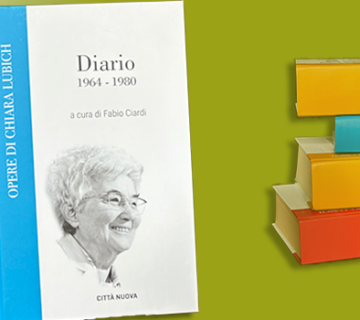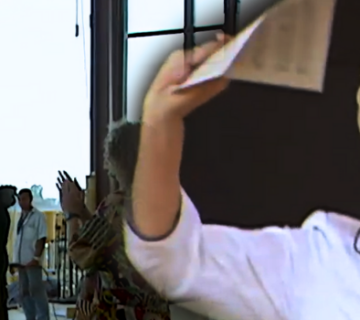 “You represent an important component in the peace process that humanity is waiting for.” Maria Voce joyfully welcomed diplomats gathered at the International Centre of the Focolare Movement in Rocca di Papa, on 8 June 2011, the same centre which was visited by Pope John Paul II in 1984.
“You represent an important component in the peace process that humanity is waiting for.” Maria Voce joyfully welcomed diplomats gathered at the International Centre of the Focolare Movement in Rocca di Papa, on 8 June 2011, the same centre which was visited by Pope John Paul II in 1984.
Thirteen ambassadors attended and five diplomats representing their respective embassies. There were also representatives from some dicasteries of the Roman Curia, as well as the president of the Focolare and members of the General Council of the Movement.
 The recent beatification of Pope Wojtyla encouraged the Focolare and the Embassy of Poland to the Holy See to promote the meeting, in the desire to express their deep gratitude to John Paul II, who followed the Focolare with such great love ever since he was a bishop in Poland. This meeting follows a previous one directed to the Ambassadors accredited to the Holy See, which was held in 2010 on the second anniversary of the death of the Movement’s founder, Chiara Lubich.
The recent beatification of Pope Wojtyla encouraged the Focolare and the Embassy of Poland to the Holy See to promote the meeting, in the desire to express their deep gratitude to John Paul II, who followed the Focolare with such great love ever since he was a bishop in Poland. This meeting follows a previous one directed to the Ambassadors accredited to the Holy See, which was held in 2010 on the second anniversary of the death of the Movement’s founder, Chiara Lubich.
“We see you engaged in dialogue – continued Maria Voce, who was returning from a long trip to Eastern Europe -. immersed in a society characterized by tensions, conflicts, threats, and even wars, you play an invaluable role.” She also pointed out the “similarity” between the work of diplomats and that of the Focolare Movement: In fact, the Movement’s “precise purpose is to contribute to the realization of Jesus’ dream: ‘That all be one’.”
 Among the speakers, Ms. Anna Kurdziel, First Secretary of the Polish Embassy, underscored the affinity between John Paul II and Chiara Lubich, two extraordinary figures of the 1900’s, in an evangelization which starts from love. The Italian ambassador to the Holy See, Francesco Maria Greco, recalled the legacy of John Paul II for Italy, not least the importance he gave to the ecclesial movements, a cohesive force in the country and a moralizing strengthener of ethical standards in social life. Archbishop Joao Braz de Aviz, Prefect of the Congregation for Institutes of Consecrated Life and Societies of Apostolic Life, urged everyone “to know and appreciate the charism of unity as a very great sign of hope for today’s world. ”
Among the speakers, Ms. Anna Kurdziel, First Secretary of the Polish Embassy, underscored the affinity between John Paul II and Chiara Lubich, two extraordinary figures of the 1900’s, in an evangelization which starts from love. The Italian ambassador to the Holy See, Francesco Maria Greco, recalled the legacy of John Paul II for Italy, not least the importance he gave to the ecclesial movements, a cohesive force in the country and a moralizing strengthener of ethical standards in social life. Archbishop Joao Braz de Aviz, Prefect of the Congregation for Institutes of Consecrated Life and Societies of Apostolic Life, urged everyone “to know and appreciate the charism of unity as a very great sign of hope for today’s world. ”
The voice of a direct and authoritative witness was also heard. Eli Folonari shared what the relationship of John Paul II and Chiara Lubich was like. There was the first invitation to a Mass in his private chapel a few days after his election to the papacy, the 30 hand-signed letters, the inevitable telephone calls of congratulations which always arrived on the feastday of Saint Clare (Santa Chiara), the 9 invitations to dinner … “Chiara wanted a confirmation (from the Pope), but above all, she wanted to give him joy.” And so it was, since several times the Pope remarked that at every meeting with her or with the focolarini he felt “a great consolation.”
(www.centrochiaralubich.org)
 Two young people also offered their testimony on the meetings of John Paul II with the younger generations, and the Zanzucchi couple shared from their direct personal knowledge of the Holy Father, about his encounters with families. And space was also given to Chiara Lubich’s commitment to the communion among movements, as she promised to the Pope in Saint Peter’s Square on Pentecost 1998. Gabriella Fallacara, who worked in ecumenism for many years, then presented “Together for Europe” the path taken up by Movements and ecclesial communities in and for the European continent. It will take place again in Brussels on 5 May 2012, with simultaneous links to many European cities.
Two young people also offered their testimony on the meetings of John Paul II with the younger generations, and the Zanzucchi couple shared from their direct personal knowledge of the Holy Father, about his encounters with families. And space was also given to Chiara Lubich’s commitment to the communion among movements, as she promised to the Pope in Saint Peter’s Square on Pentecost 1998. Gabriella Fallacara, who worked in ecumenism for many years, then presented “Together for Europe” the path taken up by Movements and ecclesial communities in and for the European continent. It will take place again in Brussels on 5 May 2012, with simultaneous links to many European cities.
Monsignor Vincenzo Zani, undersecretary of the Congregation for Catholic Education together with the secretary Archbishop Jean-Louis Bruguès, asked, as a conclusion to the meeting, to share about the significance of this encounter: “I’m reminded of the meditation of Chiara Lubich entitled “Diplomacy”. Chiara spoke of “the diplomacy of love, which, because of its simplicity is able to give a soul and start the flow of blood in the structures of social and political life, which so often feel like superstructures. Today, here, there was an expression of this structure of social and political life which the embassies and diplomats are called to be. If there is love, you understand that the world needs this invisible network – hidden, but at the service of the common good, at the service of unity.”
[nggallery id=50]


 Italiano
Italiano Español
Español Français
Français Português
Português


